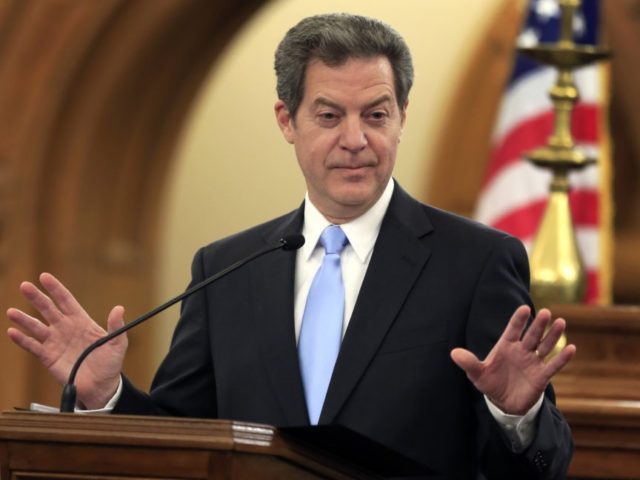ROME — Sam Brownback, the former U.S. Ambassador-at-Large for International Religious Freedom, has urged the Vatican to rethink its appeasement policy toward the Chinese Communist Party (CCP).
“The moral authority of the Vatican is significant,” Brownback told Catholic News Agency (CNA) last week. “You don’t negotiate with evil. You kick it out.”
Following the release of the U.S. State Department’s annual report on international religious freedom, Brownback said he hoped the overwhelming data on China’s persecution of people of faith would draw the Vatican’s attention.
“I hope they would look at this report and say, ‘this is not a regime we should be negotiating with,’” said Brownback, who served as U.S. Ambassador from 2018 to 2021.
“The report really documents the China’s war on all faiths,” Brownback told Breitbart News on May 13. “It’s a communist regime. The communists are atheists.
“They have trouble with any sort of allegiance to a higher moral authority — to God — and they are going at it — hammer and tongs — on everybody, whether that it’s the Tibetan Buddhists, the House Church Christians, the underground Catholic Church, Falun Gong, [or] Uyghurs,” he added.
In urging the Vatican to rethink its policy of never criticizing China’s egregious human right abuses, Brownback joins a list of leaders who have sought to bring the Holy See’s moral authority to bear on CCP leaders.
Pope Francis and other central Vatican figures have avoided criticizing ongoing violations of religious freedom in China, despite the Holy See’s constant appeals to end such abuses elsewhere.
In message after message, Pope Francis has offered up prayers for troubled regions around the world, remembering all those who suffer persecution and injustice, and yet conspicuous by its absence in the nearly exhaustive lists is any mention of the persecution of religious believers in China.
The pope himself has only had praise for China, insisting that the CCP protects religious freedom and that its “churches are full.” He has also reversed Church discipline to allow Chinese Catholic priests to enroll in the state-run Chinese Catholic Patriotic Association, which was set up under the rule of Chairman Mao Zedong as a parallel church to the church in Rome.
Francis’ efforts to appease the CCP have earned him reproach from his critics, such as the former bishop of Hong Kong, Cardinal Joseph Zen, who claims that due to his naivete, Pope Francis is “killing” the underground Church in China.
The U.S. Bishops, on the other hand, have been vocal in calling out the CCP for its constant violations of religious liberty.
“Under the Chinese Communist Party, Chinese citizens have limited religious freedom,” the bishops noted in 2020. “Since 2013, religious persecution has intensified under a government campaign for the ‘sinicization’ of religion — an effort to have religions conform to government-sanctioned interpretations of Chinese culture.”
“While the Vatican has reached a provisional agreement with China on the issue of episcopal appointments, reports of persecution by the Chinese government persist as underground churches are closed and their priests detained, crosses destroyed, bibles confiscated, and children under 18 forbidden from attending Mass and receiving religious instruction,” the bishops said.
Along with the sufferings of persecuted Christians, the bishops also underscored the situation of Muslim minorities in China, particularly the Uighurs.
“Muslims have suffered grievous human rights abuses,” the bishops wrote. “Since 2017, 800,000 to possibly two million ethnic Uighur, Kazakh, Kyrgyz, and Hui Muslims have been arbitrarily detained in mass internment camps.”
Similarly, Cardinal Charles Bo of Myanmar, president of the Federation of Asian Bishops’ Conferences, released a statement last summer noting that in China, “the Uyghur Muslims are facing what amounts to some of the contemporary world’s worst mass atrocities and I urge the international community to investigate.”
Lord Chris Patten, the former British governor of Hong Kong, has said the Vatican “got it badly wrong about China” in its 2018 accord with the Communist Party on the naming of bishops.
“It is very sad, but under Xi Jinping things have gone backwards in China,” Patten said, adding that it was “bizarre” for the Vatican to warm to the Communist Party at this time.
“How can you have a rapprochement on religious issues with China when there are a million or more Uighur Muslims locked up in Xinjiang?” asked Patten, chancellor of Oxford University since 2003.
Writing for the Sunday Times last summer, Dominic Lawson expressed bewilderment at the Vatican’s unwillingness to employ its moral authority to call the CCP to an account.
“As more and more nations have expressed their concern about the growing evidence of concentration camps and even genocide in the Chinese province of Xinjiang, there has been silence from the one entity that has the whole of suffering humanity at the core of its mission. I refer to the Holy See,” Mr. Lawson wrote.
“This is part of the Holy See’s long campaign to achieve full mutual diplomatic relations with Beijing, which Vatican diplomats imagine will give them leverage with a leading world power,” Lawson added. “But it was a concession Francis’s predecessors would not have made — especially not the fiercely anti-communist John Paul II.”
According to Sam Brownback, the Vatican risks making the same mistake that the United States made in opening up trade with China 20 years ago in the hope that China would become more democratic.
“It didn’t work,” Brownback said. “It didn’t work for us, the West, in our negotiation with China, and I don’t think it’s going to work with the Vatican.”

COMMENTS
Please let us know if you're having issues with commenting.